Access to legal abortion nationwide is increasingly more difficult, as anti-choicers chip away at the right guaranteed by Roe, attempting to render the decision a hollow statute and create a situation for millions of women and trans* and/or genderqueer men in which abortion is technically legal but functionally inaccessible.
This strategy is in direct contravention of the will of the majority. A new NBC News/Wall Street Journal poll has found that a majority of USians "believe abortion should be legal in all or most cases" and that "seven in 10 respondents oppose Roe v. Wade being overturned."
The notion that a majority of the US wants to limit access to abortion and/or criminalize it altogether is flatly false.
In pursuit of an honest national conversation about abortion, the Guttmacher Institute has put together a collection of infographics "that distill a wealth of information into five snapshots about abortion in the United States today." I am sharing them with permission.
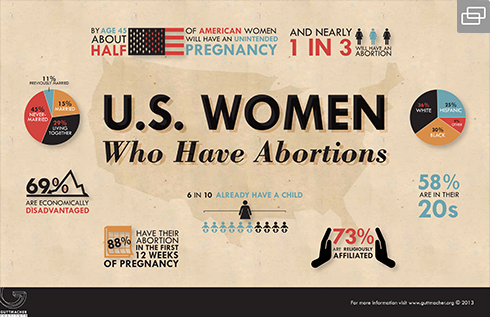
Abortion in the U.S. has become concentrated among poor women:
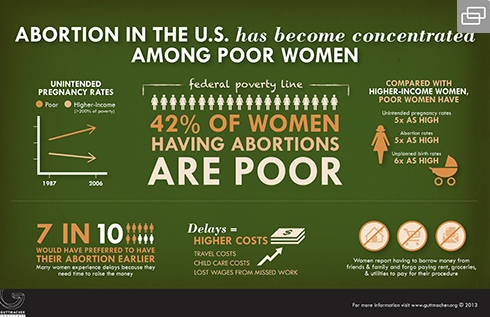
Racial & ethnic disparities in reproductive health outcomes:
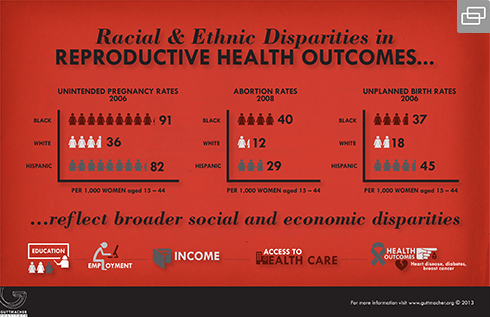
How do women pay for abortions?
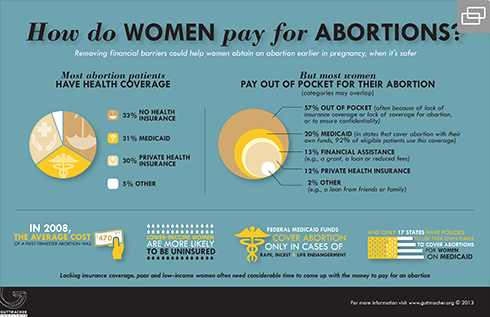
Barriers to abortion access:
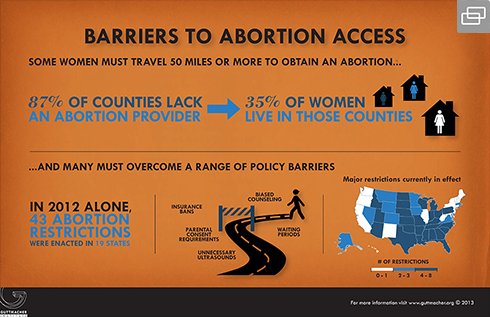
In his inauguration address, President Obama said: "We are true to our creed when a little girl born into the bleakest poverty knows that she has the same chance to succeed as anybody else, because she is an American; she is free, and she is equal, not just in the eyes of God but also in our own."
The promise to the nation's girls and women that we have the same chance to succeed as their male cohorts, that we are free, and that we are equal, cannot and will never be fulfilled as long as women and other people with uteri are not given agency over their own bodies. Control over our reproduction, over when and if we choose to reproduce, is an essential piece of girls' and women's opportunity, freedom, and equality.
This is important for privileged women, and it becomes increasingly critical for women whose identities have multiple points of marginalization, the prejudices against any of which are used to justify less access to healthcare: Women of color, poor women, women with disabilities, fat women, migrant women—which is neither a comprehensive nor mutually exclusive list.
There is no trickle-down feminism. The denial of access to abortion is not waged equally, and (re)building access to abortion across the country does not have a universal strategy. It is a legal issue; it is an economic issue; it is a social issue; it is a cultural issue; it is a religious issue; it is an educational issue; it is a justice issue. We must concern ourselves with its every aspect, to fulfill the nation's promise to its girls and women.
Forty years after Roe, what we know more clearly than ever is that Roe is still necessary, and that Roe is not enough.




Shakesville is run as a safe space. First-time commenters: Please read Shakesville's Commenting Policy and Feminism 101 Section before commenting. We also do lots of in-thread moderation, so we ask that everyone read the entirety of any thread before commenting, to ensure compliance with any in-thread moderation. Thank you.
blog comments powered by Disqus